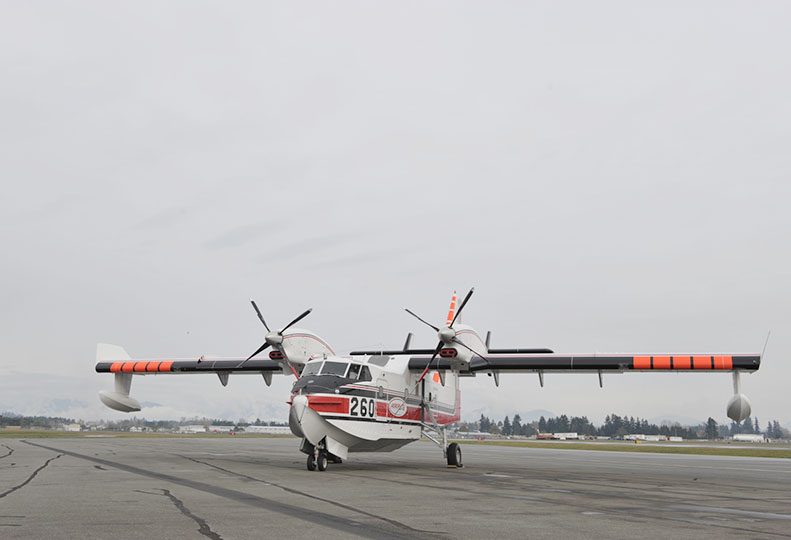
Home » Wildfire-fighting company Aero-Flite to relocate to Spokane International Airport
Wildfire-fighting company Aero-Flite to relocate to Spokane International Airport
Arizona-based company could create 22 jobs initially, more later

November 20, 2014
Aero-Flite Inc., a Kingman, Ariz.-based wild land firefighting company, is in the process of relocating its operations to a hangar on the south side of the airport, next to the air traffic control tower.
The company’s relocation is the subject of an aerospace business recruitment announcement scheduled to be held today, Nov. 20, by the Spokane Airport Board at Spokane International Airport and attended by Washington state Gov. Jay Inslee.
Aero-Flite is taking over a lease-and-operating agreement formerly held by JetTech Aerospace for most of the 70,000-square-foot, airport-owned hangar. Aero-Flite will occupy 30,000 square feet of floor space and an additional 20,000 square feet of office and maintenance shop space, says airport spokesman Todd Woodard.
Airport CEO Larry Krauter says the hangar at one time was occupied by the Air National Guard, which relocated to Fairchild Air Force Base in 2008. The hangar is sometimes known as the old Guard hangar.
“It’s a former military hangar that we converted for civilian use,” Krauter says.
Aero-Flite agreed to accept all terms and conditions of the JetTech lease and operating agreement, which lasts through Jan. 31, 2019, and includes a Washington state Community Economic Revitalization Board loan repayment commitment.
The Journal of Business first reported in July 2012 that Aero-Flite was looking at relocating to the Spokane airport. Earlier that year, the Forest Service awarded Aero-Flite, along with three other companies, contracts to provide a total of seven converted Avro RJ85s, to help replace the service’s aging fleet of planes.
Krauter says Aero-Flite’s occupation of the hangar won’t run up against the Federal Aviation Administration’s new proposed hangar use policy, which both the airport board and the Spokane Airport Tenants Association have objected to, as reported by the Journal on Nov. 6. That policy mainly pertains to private-use hangars, Krauter says.
“The FAA’s policy was dealing more with individual hangars, not those used for business purposes,” he says.
Aero-Flite, which contracts with the U.S. Forest Service for wild land firefighting and suppression, will base its aircraft, management, and mechanical operations in Spokane.
The company could bring 22 jobs to the area immediately, Woodard says, and could be hiring an additional 16 later. Woodard says Aero-Flite hasn’t finalized their employment numbers yet.
“November through March is when they typically do the off-season maintenance to their aircraft,” he says.
Aero-Flite contracts for firefighting services in the lower 48 states and Alaska, Woodard says. It’s owned by Abbottsford, British Columbia-based Conair Inc. Woodard says Spokane’s proximity to British Columbia helped move the deal along.
“The parent company also has had a very positive relationship with both Washington and the airport administration,” he says. “Because of that previous experience, they were very desirable to come to Spokane.”
Krauter says that, as part of its contract with the Forest Service, Aero-Flite has developed a next generation air tanker product, which involves converting a four-engine Avro RJ85 for firefighting use.
“They’re justifiably very proud of that,” Krauter says.
The converted turbine-powered tankers can carry a total of 2,400 gallons of fire retardant, and can cruise at 300 knots when fully loaded.
Woodard says Aero-Flite will keep four planes in the hangar; three will be Avro RJ85s. The other will be a CL-215, a Canadian plane used to scoop up water for fighting fires. The plane can scoop up to 1,400 gallons of water at a time and deliver as much as 28,000 gallons of water per hour. On its website, Aero-Flite claims to be the largest operator of water-scooping aircraft in North America.
Aero-Flite also says it has the capability to mix foam concentrate with water while in flight, as another firefighting option for customers. The company is staffed to sustain remote air operations. It also has the necessary parts, trucks, trailers, and specialized tools to support long air missions.
Aero-Flite’s website says its maintenance expertise includes inspections, both major and minor repairs, and alterations.
Normal field maintenance ranges from fixing simple oil leaks and changing cylinders to replacing entire engines.
It also has the capability for complex field repairs on aircraft hydraulic and electrical systems.
“Because of the maintenance they do and the type of aircraft they fly, I think it’s a great investment in our community,” Woodard says.
Latest News Government
Related Articles
Related Products



